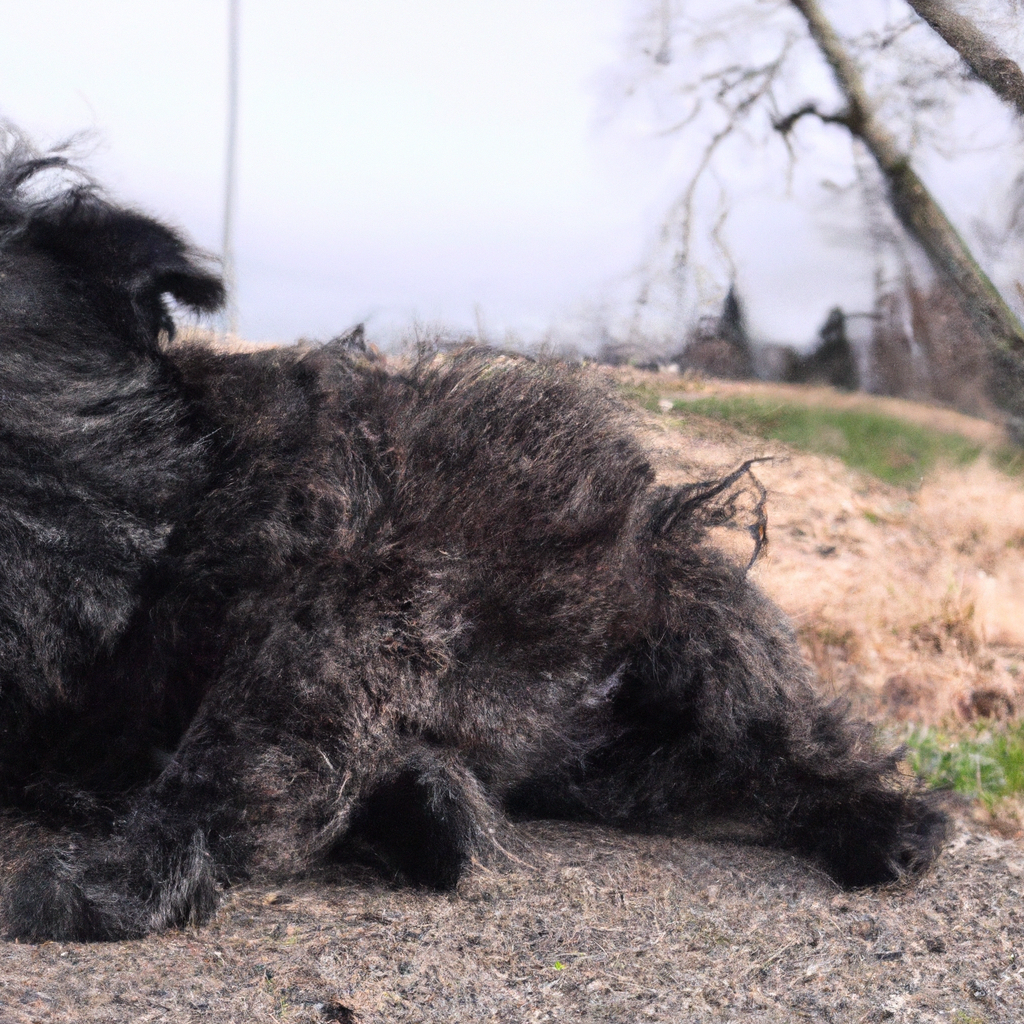The Affenpinscher, also known as the Monkey Terrier, is a small breed of dog that is known for its distinctive, monkey-like appearance. Understanding the life expectancy of an Affenpinscher involves exploring various factors such as its health, diet, and living conditions. Typically, an Affenpinscher can live between 12 to 15 years, but this can vary depending on individual health and lifestyle factors. This introduction aims to delve into the factors that influence the lifespan of an Affenpinscher, providing a comprehensive understanding of their life expectancy.
Exploring the Lifespan of an Affenpinscher: What to Expect
Understanding the life expectancy of an Affenpinscher, a small but mighty breed of dog, is an essential part of responsible pet ownership. Affectionately known as “monkey dogs” due to their distinctive, primate-like faces, Affenpinschers are a unique breed with a lifespan that may surprise you.
Affenpinschers are generally a healthy breed, with a life expectancy that ranges from 12 to 15 years. However, like any breed, they are prone to certain health conditions that can potentially impact their lifespan. It’s important to note that while these health conditions are possible, they are not guaranteed to occur in every Affenpinscher.
One of the most common health issues in Affenpinschers is hip dysplasia, a condition that affects the hip joint and can lead to arthritis or even lameness if left untreated. Another common issue is patellar luxation, where the kneecap dislocates or moves out of its normal position. This condition can cause pain and mobility issues, and in severe cases, may require surgery.
Heart disease is another potential health concern for Affenpinschers. This breed is particularly prone to a condition called mitral valve disease, which affects the heart’s ability to pump blood efficiently. Regular check-ups with a vet can help detect this condition early and manage it effectively.
Despite these potential health issues, Affenpinschers are known for their robust health and longevity. This is largely due to their active lifestyle and small size. Affenpinschers love to play and explore, and this high level of activity helps keep them healthy and fit. Their small size also contributes to their long lifespan, as smaller breeds tend to live longer than larger ones.
Of course, the lifespan of an Affenpinscher can be significantly influenced by the care it receives. A balanced diet, regular exercise, and routine vet check-ups are crucial for maintaining an Affenpinscher’s health and ensuring a long, happy life.
Affenpinschers are also known for their strong, spirited personalities. They are fearless, curious, and always ready for an adventure. This zest for life can contribute to their longevity, as a positive attitude and active lifestyle are known to promote good health and longevity in dogs.
In conclusion, while the Affenpinscher breed is prone to certain health conditions, they are generally a healthy and long-lived breed. With proper care, regular vet check-ups, and a healthy lifestyle, an Affenpinscher can live a long, happy life.
Remember, every Affenpinscher is unique, and individual dogs may have different health needs and life expectancies. It’s always important to consult with a vet to understand your Affenpinscher’s specific health needs and potential risks.
Understanding the life expectancy of an Affenpinscher is just one part of responsible pet ownership. By providing your Affenpinscher with the care and attention it needs, you can help ensure that your furry friend lives a long, healthy, and happy life.
Factors Influencing the Life Expectancy of Affenpinschers
Understanding the life expectancy of an Affenpinscher, a small but mighty breed of dog, is crucial for any potential or current owner. This breed, also known as the “Monkey Terrier” due to its primate-like appearance, is known for its longevity, with an average lifespan of 12 to 15 years. However, several factors can influence this life expectancy, including genetics, diet, exercise, and overall care.
Firstly, genetics play a significant role in the lifespan of an Affenpinscher. Like all breeds, Affenpinschers are predisposed to certain health conditions. For instance, they are prone to hip dysplasia, a condition that affects the joint of the hip, and patellar luxation, a condition where the kneecap dislocates out of its normal position. These conditions can affect the quality of life and potentially reduce the lifespan of an Affenpinscher. Therefore, it’s essential to ensure that your Affenpinscher comes from a reputable breeder who tests their breeding dogs for these and other genetic conditions.
Next, diet is another crucial factor that can influence the life expectancy of an Affenpinscher. A balanced diet rich in high-quality proteins, healthy fats, and a variety of fruits and vegetables can contribute to a longer, healthier life. On the other hand, a diet high in processed foods and sugars can lead to obesity, which can shorten an Affenpinscher’s lifespan. Therefore, it’s important to feed your Affenpinscher a balanced diet and monitor their weight regularly.
Exercise is another key factor in the lifespan of an Affenpinscher. Despite their small size, Affenpinschers are energetic and require regular exercise to maintain a healthy weight and overall good health. Regular walks, playtime, and mental stimulation can help keep an Affenpinscher healthy and potentially extend their lifespan. However, it’s important to remember that Affenpinschers are brachycephalic, meaning they have short noses and flat faces, which can make them prone to overheating. Therefore, it’s crucial to provide exercise in a safe and controlled manner.
Lastly, overall care can significantly influence the life expectancy of an Affenpinscher. Regular vet check-ups can help catch any potential health issues early, increasing the chances of successful treatment and potentially extending the lifespan of an Affenpinscher. Additionally, good dental hygiene can prevent dental diseases, which can lead to other serious health issues if left untreated.
In conclusion, while the Affenpinscher is known for its longevity, several factors can influence this life expectancy. Genetics, diet, exercise, and overall care all play a significant role in the lifespan of an Affenpinscher. By understanding these factors, owners can take steps to provide the best possible care for their Affenpinscher, potentially extending their lifespan and ensuring they live a long, healthy, and happy life.
Understanding the Health Issues Affecting Affenpinscher Lifespan
Understanding the life expectancy of an Affenpinscher, a small but mighty breed, is crucial for any potential or current owner. This breed, known for its monkey-like face and playful personality, typically lives between 12 to 15 years. However, like any breed, the Affenpinscher’s lifespan can be influenced by a variety of factors, including genetics, diet, exercise, and overall health care. In particular, there are several health issues that can affect the lifespan of an Affenpinscher, which we will delve into in this article.
Firstly, it’s important to note that Affenpinschers, like many small breeds, are prone to certain genetic conditions. One of these is hip dysplasia, a condition where the hip joint doesn’t fit together properly, leading to discomfort and mobility issues. While this condition can be managed with medication and lifestyle adjustments, it can impact the quality and length of an Affenpinscher’s life. Regular vet check-ups can help detect this condition early and put a management plan in place.
Next on the list is a condition called patellar luxation. This is a common issue in small dogs where the kneecap dislocates or moves out of its normal position. This can cause pain and lead to arthritis if left untreated. Again, regular vet visits can help catch this issue early, and surgery can often correct the problem.
Heart disease is another health issue that can affect the lifespan of an Affenpinscher. Specifically, this breed is prone to a condition called mitral valve disease, which affects the heart’s ability to pump blood effectively. Symptoms can include coughing, fatigue, and difficulty breathing. While this condition can be serious, with early detection and proper treatment, many dogs can live a normal life.
In addition to these genetic conditions, Affenpinschers can also be prone to certain eye conditions, such as cataracts and glaucoma. Regular eye exams can help catch these conditions early and prevent them from causing serious issues.
Furthermore, dental disease is a common issue in small breeds like the Affenpinscher. Regular dental care, including brushing and professional cleanings, can help prevent this issue and extend your dog’s life.
While these health issues may sound daunting, it’s important to remember that not all Affenpinschers will experience these problems. Many live healthy, happy lives well into their teens. The key is regular veterinary care to catch any potential issues early and address them promptly.
Moreover, a balanced diet and regular exercise can also play a significant role in an Affenpinscher’s lifespan. A diet rich in high-quality protein, fruits, vegetables, and whole grains can help maintain a healthy weight and prevent obesity-related health issues. Regular exercise, meanwhile, can help keep your Affenpinscher’s heart healthy and its joints flexible.
In conclusion, while there are several health issues that can affect the lifespan of an Affenpinscher, many of these can be managed or even prevented with proper care. Regular vet visits, a balanced diet, and regular exercise are all crucial for keeping your Affenpinscher healthy and extending its lifespan. With the right care, your Affenpinscher can live a long, happy life by your side.
The Role of Diet in Extending an Affenpinscher’s Life Expectancy

Understanding the life expectancy of an Affenpinscher, a small but mighty breed of dog, is crucial for any potential or current owner. One of the key factors that can significantly influence an Affenpinscher’s lifespan is its diet. Just like humans, dogs require a balanced and nutritious diet to maintain their health and vitality.
Affenpinschers, affectionately known as “Monkey Dogs” due to their primate-like appearance, typically live between 12 to 15 years. However, with the right diet, regular exercise, and proper veterinary care, these feisty little dogs can live even longer.
The role of diet in extending an Affenpinscher’s life expectancy cannot be overstated. A well-balanced diet can help prevent obesity, a common issue in small dog breeds. Obesity can lead to a host of health problems, including diabetes, heart disease, and joint issues, all of which can shorten a dog’s lifespan.
Feeding your Affenpinscher a diet rich in lean proteins, healthy fats, and a variety of fruits and vegetables can help maintain a healthy weight and provide the necessary nutrients for optimal health. Lean proteins, such as chicken or fish, provide the essential amino acids needed for muscle development and repair. Healthy fats, like those found in fish oil or flaxseed, support brain development, reduce inflammation, and promote a shiny, healthy coat.
Fruits and vegetables, on the other hand, are a great source of vitamins, minerals, and fiber. They support the immune system, promote good digestive health, and can help prevent certain types of cancer. However, it’s important to remember that not all fruits and vegetables are safe for dogs. Always do your research or consult with your vet before introducing new foods into your dog’s diet.
In addition to a balanced diet, Affenpinschers also need plenty of fresh water. Dehydration can lead to serious health issues, including kidney disease and heatstroke. Always ensure your Affenpinscher has access to clean, fresh water, especially during hot weather or after exercise.
While diet plays a significant role in extending an Affenpinscher’s life expectancy, it’s not the only factor. Regular exercise is also crucial. Affenpinschers are active and playful dogs that require daily physical activity to maintain their health and happiness. Regular walks, playtime, and mental stimulation can help prevent obesity, reduce anxiety, and improve overall well-being.
Regular veterinary care is another essential component of an Affenpinscher’s longevity. Regular check-ups can help detect potential health issues early, allowing for prompt treatment and better outcomes. Vaccinations, parasite prevention, and dental care are also important aspects of maintaining your Affenpinscher’s health.
In conclusion, the role of diet in extending an Affenpinscher’s life expectancy is significant. A balanced diet, combined with regular exercise and veterinary care, can help ensure your Affenpinscher lives a long, healthy, and happy life. Remember, every dog is unique, and what works for one may not work for another. Always consult with your vet to determine the best diet and care routine for your Affenpinscher.
How Regular Exercise Contributes to an Affenpinscher’s Longevity
Understanding the life expectancy of an Affenpinscher is a topic of interest for many dog lovers, especially those who are considering bringing this adorable breed into their homes. Affenpinschers, also known as “Monkey Terriers” due to their primate-like appearance, are small but sturdy dogs that typically live between 12 to 15 years. However, like any other breed, the lifespan of an Affenpinscher can be significantly influenced by various factors, including diet, healthcare, and notably, regular exercise.
Exercise plays a crucial role in ensuring the longevity of an Affenpinscher. This breed is known for its energetic and playful nature, which means they require a good amount of physical activity to stay healthy and happy. Regular exercise not only helps to maintain their ideal weight, but it also contributes to their overall well-being.
To begin with, exercise helps to keep an Affenpinscher’s weight in check. Obesity is a common problem in dogs, and it can lead to a host of health issues, including heart disease, diabetes, and arthritis. These conditions can significantly shorten a dog’s lifespan. By ensuring your Affenpinscher gets regular exercise, you can help prevent obesity and the health problems associated with it.
Moreover, exercise is beneficial for an Affenpinscher’s mental health. These dogs are intelligent and curious, and they need mental stimulation as much as they need physical activity. Exercise, especially activities that challenge them mentally like agility training or puzzle toys, can help keep their minds sharp. A mentally stimulated Affenpinscher is a happy Affenpinscher, and a happy dog is generally a healthier dog.
In addition to physical and mental health benefits, regular exercise can also help to strengthen the bond between you and your Affenpinscher. This breed thrives on companionship and loves spending time with their human family. By exercising together, whether it’s going for a walk, playing fetch in the park, or participating in a dog sport, you’re not only improving your dog’s health but also enhancing your relationship with them.
However, it’s important to remember that while exercise is beneficial, it should be appropriate for your Affenpinscher’s age, size, and health condition. Puppies and older dogs may not be able to handle the same level of physical activity as a young adult dog. Similarly, dogs with health issues may need a modified exercise routine. Always consult with your vet to determine the right amount and type of exercise for your Affenpinscher.
In conclusion, regular exercise is a key factor in promoting the longevity of an Affenpinscher. It helps to maintain their ideal weight, keeps their minds sharp, and strengthens the bond between them and their human family. However, the exercise should be appropriate for the dog’s age, size, and health condition. By ensuring your Affenpinscher gets the right amount and type of exercise, you can help them live a long, healthy, and happy life.
The Impact of Genetic Factors on an Affenpinscher’s Life Expectancy
Understanding the life expectancy of an Affenpinscher, a small but mighty breed of dog, is a topic of interest for many pet owners and dog enthusiasts. This breed, known for its distinctive monkey-like face and playful personality, has a life expectancy that is influenced by a variety of factors. One of the most significant of these is genetics.
Genetic factors play a crucial role in determining the lifespan of an Affenpinscher. Like all breeds, Affenpinschers have certain genetic predispositions that can impact their health and longevity. For instance, they are prone to certain health conditions such as hip dysplasia, heart disease, and respiratory issues. These conditions, if not properly managed, can significantly reduce an Affenpinscher’s life expectancy.
However, it’s important to note that just because a dog has a genetic predisposition to a certain condition, it doesn’t mean they will definitely develop it. Many Affenpinschers live long, healthy lives without ever experiencing these health issues. It’s also worth noting that advances in veterinary medicine have made it possible to manage many of these conditions effectively, thereby increasing the potential lifespan of Affenpinschers.
On the flip side, genetics can also work in an Affenpinscher’s favor. This breed is known for its robust health and vitality, traits that are largely inherited. Affenpinschers are typically energetic and agile, characteristics that can contribute to a longer life expectancy. They also have a relatively low risk of obesity, a common issue in many dog breeds that can lead to a host of health problems and a shortened lifespan.
In addition to these physical traits, Affenpinschers also inherit certain behavioral traits that can impact their life expectancy. For example, they are known for their alertness and intelligence, traits that can help them avoid danger and injury. They are also typically quite adaptable, which can help them cope with changes in their environment or routine that could otherwise cause stress and negatively impact their health.
While genetics play a significant role in an Affenpinscher’s life expectancy, it’s important to remember that they are not the only factor. Environmental factors, such as diet, exercise, and access to veterinary care, also play a crucial role. A well-cared-for Affenpinscher that receives regular check-ups, a balanced diet, and plenty of exercise can often overcome genetic predispositions and live a long, healthy life.
In conclusion, understanding the life expectancy of an Affenpinscher requires a comprehensive understanding of the breed’s genetic factors. These factors can both increase and decrease an Affenpinscher’s potential lifespan, depending on the specific traits and predispositions involved. However, with proper care and attention to their health, Affenpinschers can live fulfilling lives well into their teens. As with any breed, the key to a long, healthy life for an Affenpinscher lies in a combination of good genetics, a healthy lifestyle, and regular veterinary care.
The Importance of Regular Vet Check-ups for Affenpinscher Lifespan
Understanding the life expectancy of an Affenpinscher, a small but mighty breed of dog, is crucial for any potential or current owner. This breed, known for its monkey-like face and playful personality, typically lives between 12 to 15 years. However, like any other breed, the lifespan of an Affenpinscher can be significantly influenced by various factors, including diet, exercise, genetics, and most importantly, regular vet check-ups.
Regular vet check-ups play a pivotal role in ensuring the longevity of your Affenpinscher. These visits are not just about getting vaccinations or treating illnesses; they are about preventive care. Just as humans need regular health check-ups, so do our furry friends. Regular vet visits can help detect potential health issues early, which can significantly increase the chances of successful treatment and improve the quality of life for your pet.
During these check-ups, the vet will conduct a thorough physical examination of your Affenpinscher. They will check its eyes, ears, teeth, skin, and coat for any signs of abnormalities or potential health issues. They will also listen to its heart and lungs, and examine its abdomen to ensure everything is functioning as it should. This comprehensive examination can help detect early signs of diseases that are common in Affenpinschers, such as hip dysplasia, heart disease, and dental problems.
In addition to physical examinations, regular vet check-ups also include routine blood tests and screenings. These tests can provide a wealth of information about your Affenpinscher’s overall health and can help detect underlying conditions that may not be apparent through a physical examination alone. For instance, blood tests can reveal issues like anemia, infections, or organ dysfunction, while screenings can help identify conditions like cancer or heart disease.
Moreover, regular vet visits are an excellent opportunity for you to discuss any concerns or questions you may have about your Affenpinscher’s health or behavior. Your vet can provide valuable advice on topics like diet, exercise, grooming, and training, which can all contribute to your pet’s overall health and longevity.
Another crucial aspect of regular vet check-ups is vaccinations. Vaccines protect your Affenpinscher from various diseases, some of which can be life-threatening. Your vet will ensure that your pet is up-to-date on its vaccinations and will recommend any additional vaccines that may be beneficial based on your pet’s age, lifestyle, and overall health.
Lastly, regular vet check-ups can help establish a baseline of your Affenpinscher’s health. This means that your vet will have a record of what’s normal for your pet, which can be incredibly helpful in detecting any changes or abnormalities in the future.
In conclusion, regular vet check-ups are an essential part of maintaining your Affenpinscher’s health and ensuring a long, happy life. These visits provide an opportunity for early detection and prevention of diseases, routine vaccinations, and valuable advice on your pet’s care. So, if you want to maximize the life expectancy of your Affenpinscher, make sure to schedule regular vet visits. After all, prevention is always better than cure, especially when it comes to the health and well-being of our beloved pets.
Affenpinscher Lifespan: Debunking Myths and Misconceptions
Understanding the life expectancy of an Affenpinscher, a breed of domestic dog, can be a complex task due to the myriad of myths and misconceptions that surround it. This article aims to debunk these misconceptions and provide a clear, factual understanding of the Affenpinscher’s lifespan.
The Affenpinscher, also known as the “Monkey Terrier” due to its primate-like appearance, is a small but sturdy breed. Originating from Germany, these dogs were initially bred to work, specifically to eliminate pests like rats and mice in homes and stables. Today, they are primarily kept as companion animals, known for their loyalty, intelligence, and playful nature.
One common misconception about the Affenpinscher’s lifespan is that they live significantly shorter lives than other breeds. This is not true. In fact, the Affenpinscher has a relatively long lifespan compared to other breeds of similar size. On average, an Affenpinscher can live between 12 to 15 years, with some even reaching the ripe old age of 17 or 18. This is comparable to, if not longer than, the lifespan of many other small dog breeds.
Another myth that often circulates about the Affenpinscher’s lifespan is that they are prone to a multitude of health issues that can shorten their lives. While it’s true that the breed can be predisposed to certain health conditions, such as hip dysplasia, heart disease, and respiratory issues, these are not exclusive to the Affenpinscher. Many dog breeds have potential health risks, and with regular vet check-ups and a healthy lifestyle, these conditions can be managed effectively, ensuring a long and happy life for your Affenpinscher.
It’s also important to note that the lifespan of an Affenpinscher can be greatly influenced by factors such as diet, exercise, and overall care. A balanced diet, regular exercise, and routine veterinary care are essential for any dog’s longevity, and the Affenpinscher is no exception. Feeding your Affenpinscher high-quality dog food, ensuring they get plenty of physical activity, and scheduling regular vet visits can significantly contribute to their overall health and longevity.
Moreover, the environment in which an Affenpinscher is raised can also impact their lifespan. Affenpinschers thrive in loving, secure environments. They are social animals that enjoy being part of a family. Stressful or neglectful situations can negatively impact their health and, consequently, their lifespan.
In conclusion, the lifespan of an Affenpinscher is not significantly shorter than other breeds, nor are they riddled with health issues that drastically reduce their life expectancy. Like any breed, they have potential health risks, but these can be effectively managed with proper care and regular veterinary check-ups. Their lifespan, like that of any dog, can be greatly influenced by their diet, exercise, overall care, and environment. By providing your Affenpinscher with a balanced diet, regular exercise, routine veterinary care, and a loving environment, you can help ensure they live a long, healthy, and happy life.After researching and analyzing data, it can be concluded that the life expectancy of an Affenpinscher is typically between 12 to 15 years. This lifespan can be influenced by various factors including diet, exercise, genetics, and quality of veterinary care.





